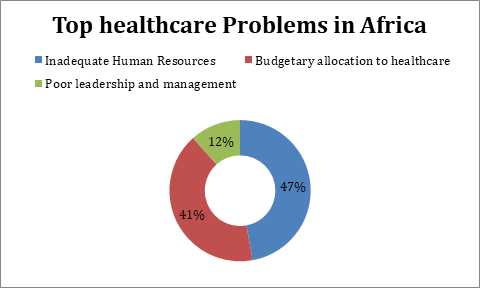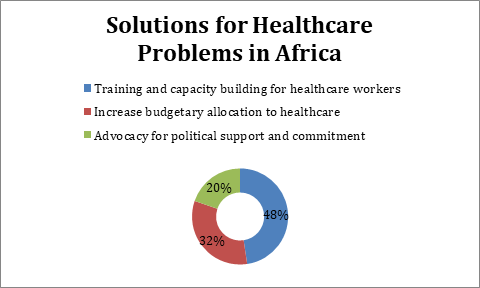According to WHO, the public health sector contributes to almost 85% of healthcare provided to the people of Africa. Public health is the most critical intervention that should focus on meeting the healthcare goals of curing people.
Healthcare in Africa and Its Prominent Challenges
The Sub-Saharan African region’s healthcare system remains the worst in the world. According to WHO, only a very few countries in Africa are capable of spending around $34–$40/person a year. It is the bare minimum value that a person can spend for primary healthcare considered by the WHO.
Africa experiences the biggest problems in healthcare today. According to a recent survey undertaken, the below chart portrays the significant problems among the many that are prevalent.

Source: Dove Press
The feasible solution for health care problems toward which Africa can work to eradicate are given below:

Source: Dove Press
Public healthcare and public health workers are in demand at the moment in Africa. The received and allocated financial support received is not utilized properly.
Moreover, the lack of educated public health workers is tremendously insufficient for such a population-bearing continent. Only 1,400 professional epidemiologists are available throughout Africa when almost around 6,000 are required. Here is where democratic public health steps in.
Democratic Public Health
Democratic public health is where the people come forward to help uplift the health situation of the public. These people are like the first line of defense. They deal with the prevention of diseases, enforce safety methods, and spread awareness through education. It also includes social workers, epidemiologists, food and safety inspectors, first responders, nutritionists, and many more.
Democratic Public Health Initiative – Why Does Africa Need It?
Africa is known to suffer from HIV/AIDS, tuberculosis, and malaria. Donor attention has provided remarkable efforts to fight these diseases. Nevertheless, most of the regions do not possess the apt infrastructure to deliver healthcare. The GDP spend on Africa is almost 3.7% on healthcare.
Also, Africa faces a severe shortage of well-trained medical personnel. Public healthcare facilities in Africa are constantly improved. However, the ratio of physicians is just 1 per 2000 people, which is very below the global scale. Despite Africa being a poverty-ridden land, individuals meet their medical expenses and pay from their pockets.
Majorly the average people prefer private clinics and hospitals for receiving quality treatment. Even though it is expensive and sometimes requires upfront payment even before the treatment, people are willing. However, not all people can afford diagnostics and treatment from private healthcare institutions. It is a significant concern, and Africa needs a democratic public health initiative.
More public health enthusiasts should be made aware of the opportunities available in the field of public health. Africa’s economies are improving, and the need for better quality healthcare will also see a rise further. There are many ways of encouraging democratic public health in Africa. They are:
a. Volunteering in Public Health Activities
Time and commitment are significant when it comes to volunteering. Specific jobs do not require any expertise like helpdesk support, record maintenance, awareness program organizing, etc.
Any volunteering work with the proper guidance and sometimes training can highly benefit socio-economically. It can improve a person mentally as well as physically. Setting up camps in rural and distant areas can be done for minor diagnostics or providing relief. It is the right way of spreading awareness of public health and its amenities.
b. Getting Professional Degrees in Public Health
Public health practitioners help to increase the growth of the socio-economic and environmental health of communities. They do it by focusing on a broad spectrum of public health difficulties such as:
- Imbalance in accessing healthcare
- Possible outcomes of limited health facility
- Social distancing and isolation
- Violence and traumatization
- Food security and lack of nutrition
A master of public health (MPH) is a professional degree. It is designed to educate students on effective protection methods and ways to improve the health of populations worldwide.
MPH is a skill-based degree with broad applicability and demand across several disciplines in the healthcare industry. The United States Bureau of Labor Statistics predicts the percentage of healthcare occupations to increase by 14% by 2028.
c. Taking up Crucial Roles in Any of the Public Health Industry
Medical roles that are in scarcity and require more skilled personnel include:
- substance abuse, psychotherapy, and mental health counselors;
- dieticians and nutritionists;
- epidemiologists;
- healthcare administrators; and
- registered nurses.
d. Save More on Africa’s Economy with Public Health Provisions
Many African patients travel to India and other countries to receive economic and effective medical procedures. The cost of treatment and allied facilities provided to the patients are affordable and with a high treatment success ratio. The lack of enough public health professionals is an important reason for this situation.
With the initiation of many African Centres for Disease Control and Prevention, many public health-related vacancies have arisen. It is a three-year-old body with goals to improve overall medical facilities and emergency readiness.
The need for pharmaceutical laboratories and local manufacturing of medicines and equipment can cut down the import costs. It will also create significant employment opportunities for public health professionals. Thus, economical and high-quality medical treatment and diagnosis are necessary for the people in Africa. Providing the facilities in Africa can save the country millions of dollars spent every year.
Democratic Public Health Can Improve Africa’s Healthcare System
The presence of public health institutions and practices can drastically benefit human development in many ways. It includes overall demographic health and well-being.
Benefits of democratic public health are:
- preventing a full-scale epidemic,
- providing affordable and quality healthcare to all,
- meeting the needs of insufficient public health professionals,
- establishing exceptional standards of public accountability,
- global cooperation imperative to ensure health, and
- awareness and access to the freely available information.
Many public health courses are being made available for those who are interested in providing service to the public health industry. A professional degree in public health can help many people play a vital role in the public health sector.
Many people are already rendering their services in public health departments. They wish to pursue a higher degree in public health. However, due to a tight schedule and lack of proper facilities, they are unable to do so. They can pursue a master’s in public health courses.
Some universities offer public health programs online, full-time, and even part-time. For example, Texila American University (Zambia) offers a master’s in public health online. Based on one’s convenience and timing, they can choose the mode of learning. By pursuing a master’s in public health degree, one will learn about the issues that are crashing communities worldwide and how to handle them.
See Also: Growth of Public Health Sector in Africa
By pursuing a master’s in public health degree, one will learn about the issues that are crashing communities worldwide and how to handle them. Besides, the master’s in public health salary is also high. It ranges from $40,000 to $99,000 per year depending upon the sector and service they choose. It also opens up a range of opportunities to serve Africa’s larger community.
People volunteering or involving themselves in public health activities will improve the healthcare system and the health of Africa. Besides poverty, most of the African countries suffer from severe illness and could not get access to proper medical facilities. The involvement of the common public will help the entire continent to grow as a healthy region.






